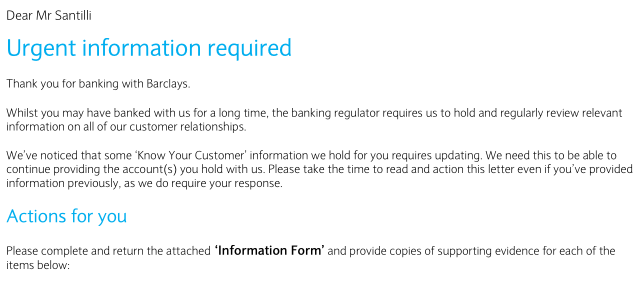On Friday 18th October 2024, Ciro Santilli received a call from Barclays asking where some of the money in his Barclays account came from and went to, obviously linked to the Monero donation and sale.
The following day, the 19th, a "explain your income in 30 days or you'll lose you account" letter arrived, dated from the 8th of October. This had been available on the online documents, but Ciro did not get an email for it so he was unaware.
The following Tuesday, the 22nd, Ciro noticed that all payments from his card were being declined, and upon calling Barclays they said that this was for pending regulatory issues. His account had been frozen.
The following Tuesday, 29th of November, Ciro noticed that a regular payment had gone through. He then tested his card and it was working again, so at some point the account had been unfrozen.
Part of me wants the donor to give me his real identity and sort this out. It would likely be better for the OurBigBook Project. But the other part of me wants to test the British monetary system. Fun and stressful times.
The chaotic nature of Barclays' Know your customer is apparent:
- they took 6 months to flag anything
- once it was finally flaggedAlso, they freeze accounts of people who are still obviously in the country at their home address and making regular purchases locally as before. Not exactly how a criminal would act?
- their communication is a mess:
- the letter was messy, with unclear list of transactions at some points and several typos
- there was no clear notice that the account was frozen or unfrozen. While there can be a rationale for not giving notice before the freeze to prevent criminals from fleeing, once you freeze a regular account user will find it out mighty fast, so there is no point in not notifying them about it
- they block the account days after the online document had been available (which unfortunately Ciro did not see due to lack of email notification), but before you've had the time to reply. This achieves the worst of both worlds both worlds by:
- their communication is a mess:
It is also slightly fun, but not surprising, to see the AgoraDesk buyers refuse to give any contact besides their public Telegram, not even email. I'm not sure that Barclays does Telegram! Not super important though because ultimately the initial Monero donation is anonymous. Shame I started on AgoraDesk before finding out about cryptocurrency swappers such as SimpleSwap.
De-banking is apparently a widespread issue in the UK: www.uktech.news/fintech/revolut-good-reason-debank-20240909: e.g. www.uktech.news/fintech/revolut-good-reason-debank-20240909 notably mentions a well known base by, God forgive me, Nigel Farage.
Related cases:
Published at:
On the 20th of June 2025, Barclays sent another request for information repeating a few of the items from last time without clear justification of what was wrong with the previous information.
Ciro quickly printed out the documents, but didn't know where to send them to, and had to wait until the 2nd of July for the return envelope to arrive, which he sent back on the 4th of July.
Announcements:
On the 28th of July 2025, Barclays finally replied with a hopefully final (who knows, everything is such a mess with this process):So Ciro Santilli gets to keep his account and the anonymous ~80k cashed out to it, but he cannot receive further anonymous donations on it.
Following a review of the above account, we have identified large value crypto assets with unknown sources. If such activity continues, keeping this account open poses a risk that we might breach laws or regulations. We therefore request that such payments are halted and, if the transactions repeat, we will take action to close this account with immediate notice. In the event of any closure, you will be required to repay any overdraft or other borrowing on the account.
As an outcome of this, I've also had to update my donation guidelines to not count anonymous donations towards my goals.
Barclays regulation felt so sloppy that I'm sure that with some effort to essentially launder the money, e.g. cashing out smaller amounts across various accounts, which I explicitly did not do in part to test the system, I would have gotten away with it, or large part of it. But I'm not going to be the one put this theory to the test.
Announcements:
- www.quora.com/Is-it-legal-for-billionaires-to-make-anonymous-charitable-donations-How-can-it-be-determined-if-a-large-sum-of-money-was-donated-anonymously-or-not/answer/Ciro-Santilli
- x.com/cirosantilli/status/1953780424242548749
- mastodon.social/@cirosantilli/114992839094805850
- www.linkedin.com/feed/update/urn:li:share:7359544588732178434/
Articles by others on the same topic
There are currently no matching articles.
